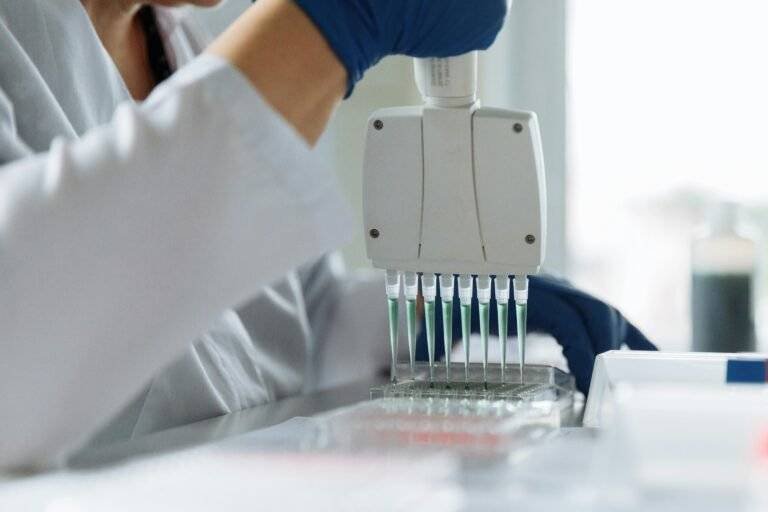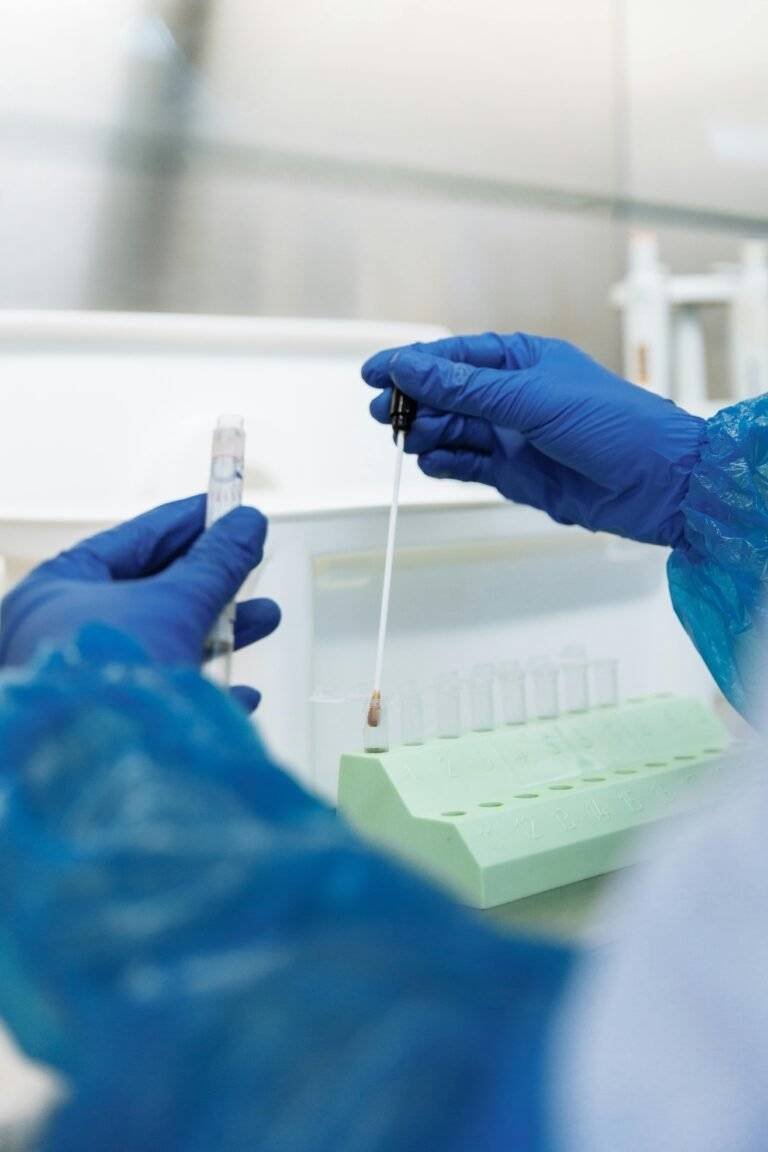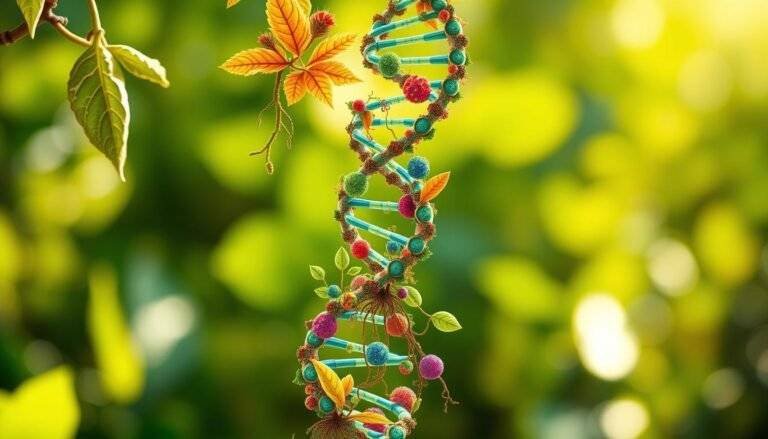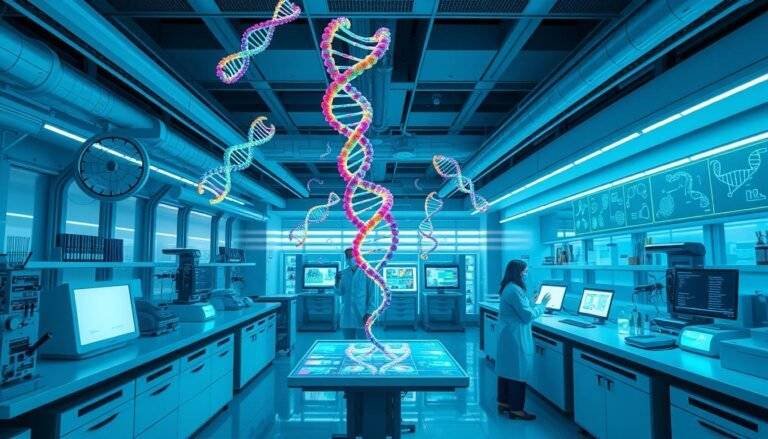Your Personalized Nutrition Genome Plan for Better Health
Personalized nutrition is changing how we think about health and wellness. It uses genetic information to give you diet plans that fit your unique needs. This approach is based on the idea that everyone’s body reacts differently to food because of their genes.
Thanks to new genetic testing, we can learn more about how your genes affect your diet. Experts can find out about your metabolism and what nutrients you need. This helps create a diet plan that helps you stay healthy and reach your wellness goals.
Key Takeaways
- Personalized nutrition plans offer over 30 DNA insights to help individuals reach their ideal healthiest self.
- The team behind these plans includes experts in genetics, pharmacology, sports nutrition, and general nutrition.
- The genetic testing kits are affordable and provide attainable personalized nutrition recommendations.
- The company has published hundreds of research papers and built a substantial library of research material.
- The personalized wellness test kit covers a wide range of health aspects, from fat burning to heart health.
Understanding the Basics of Nutrition Genome
Nutrition Genome, or nutrigenomics, is a field that looks at how our genes and food interact. It studies genetic variations to understand how diet and genes are connected. This helps us see how certain genes can change our nutritional needs and how we metabolize food.
What is a Nutrition Genome?
The nutrition genome is where nutrition, genomics, and molecular biology meet. It looks at how our genes affect how we process nutrients from food. This field helps us understand how to tailor our nutrition to our genetic makeup for better health.
Why It Matters for Your Health
Nutrigenomics is key for good health because it shows how genes can influence our diet and disease risk. For instance, some people can lower their heart disease risk by making healthy changes. It also helps athletes improve their performance and recovery by optimizing their nutrition.
“Nutrigenomics unlocks individual blueprints by studying how individuals absorb, metabolize, and transport chemicals differently based on genetic makeup.”
Learning about nutrition genome is the first step to a personalized health approach. By using nutrigenomics, you can adjust your diet and lifestyle to fit your genetic needs. This empowers you to take control of your health and reach your full potential.
The Science Behind Nutrition Genome
Nutrigenomics studies how our genes and nutrition are connected. It looks at single nucleotide polymorphisms (SNPs) and how they affect gene expression. This helps us understand how our bodies use different nutrients.
Genetic Variations and Nutritional Needs
Our genes can affect what nutrients we need. For example, changes in the FTO gene can influence fat and protein metabolism. This can impact our weight and body shape. These genetic factors can also make us more likely to get certain diseases.
Role of DNA in Metabolism
Our DNA tells our bodies how to use nutrients. New studies have found many genes linked to diseases. Knowing these genes helps us choose the right foods for better health.
How Genetics Affects Dietary Choices
Genes can also shape our food preferences. Some SNPs make us more likely to gain weight on a high-fat diet. But, the Mediterranean diet can help protect against many diseases, showing a strong link between genes and diet.
“Nutritional genomics can help identify disorders such as diabetes, metabolic syndrome, obesity, coronary heart disease (CHD), hypertension, and diabetes mellitus type 1.”
Understanding nutrition genome science helps us make better food choices. It leads to personalized diets based on our genes. This way, we can take control of our health.
Identifying Your Unique Genetic Profile
Unlocking better health through personalized nutrition starts with knowing your genetic profile. Nutrigenomic testing analyzes your DNA to find out how it affects your diet and health.
Genetic Testing for Nutrition
Nutrigenomic testing is simple. It might involve a cheek swab or blood sample. This sample is then analyzed in a lab. Researchers look at over 100 genes that affect how you process food and your health.
What to Expect from Genetic Testing
- Comprehensive analysis of 100+ genes that impact nutrient requirements, food sensitivities, and chronic disease risk
- Detailed reports on your genetic predispositions, including information on vitamin needs, toxin sensitivity, and more
- Personalized dietary recommendations tailored to your unique genetic makeup
- Guidance on optimal supplementation, exercise, and lifestyle changes to support your health goals
Nutrigenomic testing lets you discover your body’s genetic blueprint. This knowledge empowers you to make health choices that fit your genetic makeup. It’s a step towards better health through personalized nutrition.
“The ability to analyze an individual’s genome and provide personalized dietary recommendations is a game-changer in the world of nutrition and preventive healthcare.”
| Key Features of Nutrigenomic Testing | Details |
|---|---|
| Genes Covered | 100+ clinically relevant genes |
| Health Reports Provided | 170+ reports on various aspects, including Vitamin Requirements, Toxin Sensitivity, Sleep Optimization, Stress Management, Cardiovascular Health, and Mental Health |
| Test Kit Price | $359 |
| Turnaround Time | 5 weeks |
| Personalized Recommendations | Includes a Personalized Grocery List and Recommended Blood Work Report |
| Sampling and Analysis | Samples run twice on parallel arrays, including Next Generation Sequencing for best accuracy and reliable gene coverage |
Interpreting Your Nutrition Genome Results
Discovering your genetic secrets can greatly improve your health and diet. The Nutrition Genome Report analyzes your genetic variations. It offers deep insights into how your body uses nutrients.
Key Biomarkers to Review
The Nutrition Genome Report looks at 170 DNA health reports. It covers many factors that affect your nutrition and health. Key biomarkers to check include:
- Vitamin and mineral needs, like vitamin C and iron
- Genetic risks for health issues, like metabolic problems and inflammation
- Dietary sensitivities and preferences to guide your food choices
How to Read Your Results
Understanding your Nutrition Genome Report needs a healthcare expert. Dietitians or functional medicine practitioners can help. They turn complex genetic data into personalized diet advice.
The report shows how genetic variations affect nutrient use and health. For instance, if you absorb iron better, your doctor might suggest adjusting your iron intake. This helps keep your iron levels right and avoids health issues.
With your healthcare team, use your Nutrition Genome Report to create a diet plan. It will address your genetic needs, support your health, and help you reach your wellness goals.
Tailoring Your Diet Based on Your Genome
Personalized nutrition uses your genetic profile to create diet plans that improve health. It helps manage chronic diseases better. This field, known as genetic-based nutrition, is changing how we approach health and medicine.
Macronutrients and Their Genetic Links
Research in nutrigenomics has found genes that affect how we process food. For example, some genes change how we handle carbs, proteins, and fats. This knowledge helps create meal plans that improve nutrient intake and help with obesity and diabetes.
Micronutrients Specific to Genetic Profiles
Genetic tests help find out what nutrients you need based on your genes. They show how you might be at risk for certain diseases. This info helps pick the right micronutrients for your body, ensuring you get the nutrients you need for health.
Example Diet Plans
Studies show personalized diets can greatly improve health. The Habit Study found people eating based on their genes lost weight and lowered cholesterol. The Food4Me study in Europe also showed better eating habits with personalized diets.
“The integration of bioinformatics and genomics is critical for advancing personalized nutrition, promising significant advancements in public health and personalized medicine.”
Integrating Nutrition Genome into Daily Life
Unlocking your personalized nutrition plan starts with using your genetic insights every day. By matching your meal plans and supplements to your genetic profile, you can better absorb nutrients. This supports your health goals and helps you develop lasting eating habits.
Meal Planning Strategies
Creating a personalized nutrition plan begins with knowing your genetic predispositions. Some people do well on certain diets, while others need a more specific approach. By focusing on the foods and nutrients your genes like, you can make meals that really meet your body’s needs.
- Identify key genetic markers that influence your body’s nutrient requirements and metabolism.
- Explore recipes and meal ideas that emphasize the foods and nutrients your genes favor.
- Experiment with portion sizes and food combinations to find the optimal balance for your genetic profile.
Supplements and Your Genetic Profile
Customizing your supplements based on your genetic profile can greatly improve how you use nutrients. Some genetic variations affect how your body absorbs and uses vitamins and minerals. This can lead to better health and energy.
- Consult with a qualified healthcare professional to review your genetic test results and identify any areas of concern.
- Explore genetic-based supplementation options that can address your unique nutritional needs.
- Monitor the effectiveness of your personalized supplement plan and adjust as needed to achieve your health goals.
By integrating your nutrition genome insights into your daily life, you can create a personalized nutrition plan. This plan will help you achieve better health, more energy, and a sense of well-being.
The Future of Personalized Nutrition
Personalized nutrition is changing fast, thanks to new discoveries in genetics and tech. As we learn more about how genes and diet work together, we can give better advice on what to eat. This makes diets more precise and effective for everyone.
Advances in Nutritional Genomics
Science is uncovering how genes affect our nutritional needs and how we metabolize food. This info lets us create diets that fit each person’s genetic makeup. For example, people with a certain gene type might do better on certain diets.
Knowing this can help people make better food choices. It’s like getting a personalized guide for your diet.
Potential Market Trends
The market for personalized nutrition is growing fast. New genetic tests, AI tools, and custom health products are leading the way. These tools give people detailed insights into their genetic health and what they should eat.
This trend will keep growing. Soon, we’ll use even more data, like the microbiome and metabolic profiles, to create detailed health plans for everyone.
Personalized nutrition is set to change health and wellness forever. It lets people take control of their health by making smart food choices. This leads to better health and a happier life.
| Statistic | Significance |
|---|---|
| In the United States, more than 1,000 babies are born each year with congenital hypothyroidism, which is one of several monogenic diseases requiring specific treatments. The approximate cost of screening for congenital hypothyroidism is $20 million, while the benefits of treating the disease amount to $400 million annually. | This statistic highlights the importance of precision nutrition in addressing specific genetic conditions and the potential cost savings associated with early detection and targeted treatment. |
| Studies have shown that individuals with the CC genotype for the APOA2 gene tend to eat more fatty foods and gain more weight under specific dietary conditions, particularly high saturated fat diets. This genotype impact has been replicated across populations worldwide and across different ethnicities. | This statistic demonstrates the role of genetic variations in influencing dietary preferences and metabolic responses, underscoring the need for personalized nutrition approaches. |
“Personalized nutrition will likely involve integrating an individual’s genomics, epigenomics, and microbiome rather than achieving 100% personalization. It is recognized that this integration may not reach perfection, but it represents a significant step towards controlling misleading nutrition strategies in the industry.”
Common Myths About Nutrition Genome
Many people misunderstand nutrigenomics, the study of how genes and food interact. They think genetic tests for nutrition give clear answers or predict health with certainty. But, the truth is more complex.
Debunking Misconceptions
Genetic tests for nutrition aren’t a magic crystal ball. They show how your genes might react to certain foods. But, you need to look at your whole health picture, including lifestyle and medical history, to get the best health plan.
Another myth is that nutrigenomics is a one-size-fits-all solution. But, it’s actually about finding the right diet for each person. What’s good for one might not be right for another, even if they have similar genes.
The Truth About Genetic Testing
- Nutrigenetic tests give useful info on how your body reacts to food, but they can’t predict health problems for sure.
- The accuracy of genetic tests can vary. Always get help from experts like dietitians or geneticists to understand your results.
- Nutrigenomics is a way to improve health, not a cure-all for diet problems. It’s part of a bigger plan for well-being, not a single solution.
Knowing the real deal about nutrigenomics helps people make better health choices. It lets them use personalized nutrition to improve their health and well-being.
Collaborating with Nutrition Professionals
Creating a personalized nutrition plan is a team effort. You need to work with registered dietitians and other nutrition experts. It’s important to find a nutritionist or genetic counselor who knows about nutrigenomics. They will help you understand your genome results and create a diet plan that fits your health goals.
Finding the Right Nutritionist
When looking for a nutritionist, focus on those who specialize in nutrigenomics. They should be able to turn your genetic info into useful diet advice. These experts will help you see how your genes affect your nutrition needs and guide you in making better food choices.
How to Discuss Your Genome Results
- Share all the details of your genetic testing results with your nutritionist, including any important biomarkers and risk factors.
- Be open about your current diet, lifestyle, and any health issues you’re facing.
- Talk about your health goals, like losing weight, boosting energy, or preventing diseases.
- Work together with your nutritionist to create a diet plan that matches your genetic profile and lifestyle.
Registered dietitians and genetic counselors are key in making sense of your genetic nutrition plan. They help you create a diet that’s based on science and fits your life. By teaming up with these experts, you can fully benefit from nutrigenomics to improve your health.
Benefits of Following a Personalized Nutrition Plan
Getting a nutrition plan made just for you can really boost your health. The Habit Study shows big improvements in diet and lifestyle. This is thanks to a personalized wellness approach.
Enhanced Health Outcomes
The Habit Study found people ate fewer calories and got healthier. They also had better cholesterol. This is all thanks to a genetic-based health improvements plan.
The Food4Me study also showed great results. Personalized nutrition advice led to lasting changes in eating habits. This is better than just following general diet tips.
Improved Energy Levels
When your diet matches your genes, your body uses nutrients better. This means more energy and feeling more alive. You’ll be more productive and active every day.
Better Weight Management
Personalized nutrition plans help you keep a healthy weight. They consider how your body reacts to different nutrients. This way, you can stick to a diet that helps you reach your weight goals.
By using a personalized nutrition plan based on your genes, you can see big health benefits. You’ll have more energy and better weight management. All these things lead to a happier, healthier you.
Monitoring Progress Over Time
Tracking your progress is key when you follow a nutrition plan based on your genes. Using nutrition tracking apps tailored to your genetic needs can offer deep insights. These apps show how your diet changes affect your health.
Regular health check-ups and biomarker tests, like blood work, are crucial. They help you and your healthcare team see if your nutrition plan is working. By watching health metrics like weight and energy, you can tweak your plan as needed.
Tools for Tracking Dietary Changes
Use nutrition tracking apps with genetic progress monitoring. These apps let you log meals and track nutrients. They also offer personalized advice based on your genes. This way, you understand how your body reacts to food.
Assessing the Effectiveness of Your Plan
It’s also vital to see how your nutrition plan affects your health. Regular visits to your healthcare provider, with blood tests and more, are important. This helps you and your team see if your plan is working. You can then adjust your diet or lifestyle as needed.
By using technology like nutrition tracking apps and working with healthcare pros, you can manage your nutrition journey well. This helps you make informed choices for long-term health.
“Embracing personalized nutrition and monitoring progress is crucial for achieving long-term health benefits. By tracking your dietary changes and assessing their impact on your well-being, you can fine-tune your plan and stay on the path to optimal wellness.”
The Role of Lifestyle Changes
Personalized nutrition plans work best with lifestyle changes tailored just for you. Genetic insights help guide the best exercise and stress management. This complements your nutrition plan based on your genes.
Exercise and Its Genetic Correlations
Your genes can show what exercise is best for you. Genetic tests reveal if you’re good at long-distance runs or quick, powerful workouts. Choosing the right exercise based on your genes helps you get the most out of it and avoid injuries.
Stress Management Techniques
Stress can change how your genes work and affect how you use nutrients. Using stress-reducing strategies that fit your genes can help. Techniques like mindfulness, yoga, or special supplements might be especially good for you.
Adding these lifestyle changes to your nutrition plan is key to the best health. By using genetics, you can make a plan that covers all parts of your health. This includes diet, exercise, and managing stress.
“Personalized nutrition and lifestyle interventions have the potential to significantly improve health outcomes, especially for those at high risk of chronic diseases.”
The Ethical Considerations of Genetic Testing
Genetic testing for personalized nutrition raises important ethical questions. Privacy and data protection, and informed consent are key concerns. These issues are vital as the technology grows.
Privacy and Data Concerns
Genetic info is very personal and sensitive. A 1992 survey showed 38% of people wanted to stop new genetic tests until privacy was sorted. It’s crucial to protect genetic data with strong security.
Informed Consent in Nutrition Genome Testing
Autonomy is key in genetic testing. It lets people decide about their health and genetic data use. They need to know the test’s nature, risks, benefits, and alternatives.
Genetic discrimination and the emotional impact of learning about health risks are also concerns. Ethical nutrigenomics must focus on consumer well-being and rights. It should ensure genetic data protection and informed consent.
“Autonomy, nonmaleficence, beneficence, and justice served as the basis for ethical analysis.”
As personalized nutrition advances, companies must prioritize privacy, data protection, and informed consent. This ensures people can make informed health decisions. It also unlocks the technology’s full potential.
Conclusion: Taking Charge of Your Health
Using personalized nutrition based on your genes is a smart way to manage your health. It lets you make better choices about what you eat and how you live. This can help stop health problems before they start.
If you’re interested in this approach, start by looking into good genetic testing services. Talk to doctors who know about nutrigenomics. And get ready to make changes that will last a long time.
Embracing Personalized Nutrition
Personalized nutrition, thanks to nutrigenomics, is a great way to take care of your health. Knowing your genetic makeup helps you adjust your diet and lifestyle. This can make your body work better and lower your risk of diseases.
This approach can boost your energy, help with weight, and improve your overall health. It’s a smart way to be proactive about your health.
Next Steps for a Healthier You
If you want to use nutrition genome empowerment, start by looking into genetic testing. Companies like Xcode Life can give you insights into your genetic predispositions and nutritional needs.
After getting your results, talk to a nutritionist or doctor who knows about nutrigenomics. They can help you make a plan that fits your genetic profile. This plan will help you reach your health goals.
FAQ
Q: What is a Nutrition Genome?
A: Nutrition Genome, also known as nutrigenomics, is the study of how our genes interact with food. It looks at how genetic differences affect our nutritional needs and how we metabolize food.
Q: Why is Nutrition Genome important for my health?
A: Nutrigenomics is key for health because it shows how genetic differences affect our response to nutrients. This can influence our risk for diet-related diseases like diabetes and obesity.
Q: How do genetic variations affect nutritional needs and metabolism?
A: Nutrigenomics studies how genetic variations, like SNPs, affect our nutritional needs and metabolism. These differences can change how we process nutrients and our risk for certain health issues.
Q: How does genetic testing for personalized nutrition work?
A: Genetic testing for personalized nutrition analyzes genetic markers that affect nutrient metabolism and dietary responses. It uses a cheek swab or blood sample to collect DNA, then analyzes it in a lab.
Q: What should I expect from my nutrition genome test results?
A: Test results give detailed info on genetic predispositions for chronic diseases, metabolic processes, and food preferences. This info helps tailor dietary recommendations to fit your unique genetic makeup.
Q: How can I interpret my nutrition genome results?
A: Understanding your nutrition genome results means analyzing how genetic variations affect your dietary needs. Health experts, like dietitians or functional medicine practitioners, help translate genetic data into practical dietary advice.
Q: How can I tailor my diet based on my genetic information?
A: Tailoring your diet to your genetic info means adjusting what you eat to match your genetic profile. This might include focusing on specific food groups or nutrients based on your genetic markers.
Q: How can I integrate nutrition genome findings into my daily life?
A: Integrating nutrition genome findings into daily life means planning meals that align with your genetic predispositions. This could include adjusting supplements based on genetic variations affecting nutrient use.
Q: What are some common myths about nutrition genome testing?
A: Common myths include thinking it’s too predictive and that it’s absolute. It’s important to remember that genetic testing gives insights into predispositions, not certainties.
Q: How can I collaborate with nutrition professionals to implement a personalized nutrition plan?
A: Working with nutrition experts, like registered dietitians or nutritionists with nutrigenomics knowledge, is key. They help interpret your genetic results and develop a suitable dietary strategy.
Q: What are the benefits of following a personalized nutrition plan based on genetic insights?
A: Personalized nutrition plans can lead to better dietary habits, lifestyle changes, and health outcomes. Studies show they can reduce calorie intake, improve body composition, and better cholesterol levels.
Q: How can I monitor my progress when following a personalized nutrition plan?
A: Tracking progress involves using nutrition apps, regular health check-ups, and biomarker testing. This helps assess the plan’s impact on health metrics. Adjustments may be needed as your body responds to dietary changes.
Q: How can lifestyle changes complement my personalized nutrition plan?
A: Lifestyle changes, like tailored exercise and stress management based on genetic insights, can boost your personalized nutrition plan’s effectiveness.
Q: What are the ethical considerations in genetic testing for nutrition?
A: Ethical concerns include privacy, data protection, informed consent, and genetic discrimination. It’s vital for companies to have strong data security and transparent policies.





